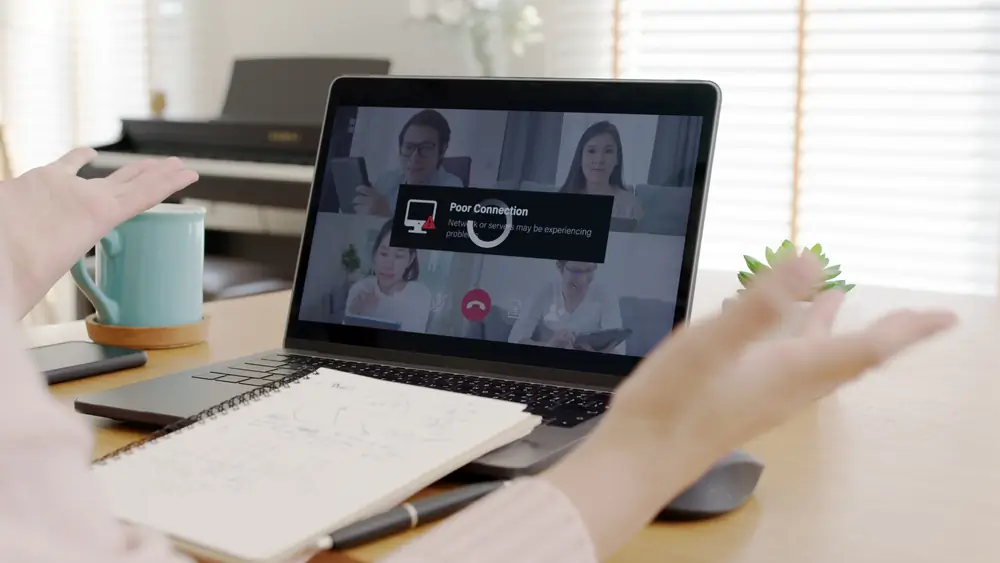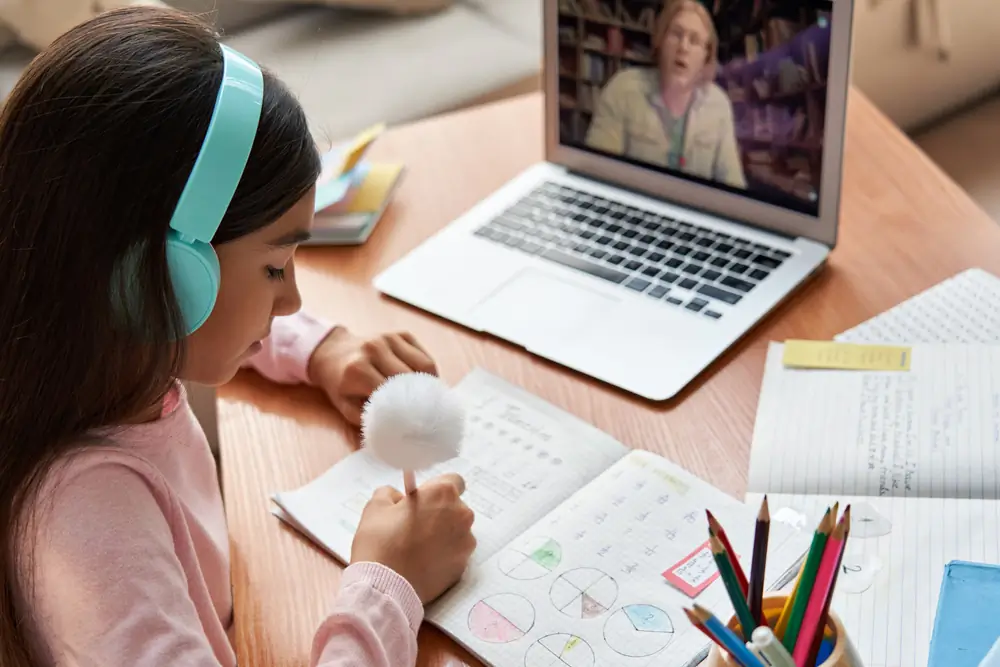Schools around the world are increasingly delivering education through online classrooms. The COVID-19 pandemic has stimulated the growth of virtual classes. The strict lockdowns in place coerced educational institutes to impart education through online classrooms. According to research, the e-learning market will grow to $325 Billion by 2025.[1] Accordingly, students started acclimatizing themselves to the new environment. However, in the absence of physical classrooms, students are facing issues pertaining to a smooth e-learning experience. We have compiled a list of online class rules to be followed by students to overcome common obstacles rattling online classes and make their e-learning more effective.
Follow Online Class Rules And Be Punctual
In an online learning environment, adhering to class rules and maintaining punctuality is key to creating a professional atmosphere. Ensure your device and internet connection are functioning well before class starts. Arriving on time not only reflects respect for the instructor but also sets a positive tone for the rest of the session. Being late can disrupt the flow of learning for both the teacher and students, so it’s important to manage your time effectively and stay organized throughout the day.
Choose A Quiet Place With No Distractions
When attending an online class, it’s crucial to create a learning space that fosters concentration. Choose a room that is free from interruptions, whether it’s family members, pets, or background noise. A quiet, distraction-free environment allows you to give your full attention to the class, ensuring that you grasp important concepts. Additionally, setting up a dedicated workspace with minimal visual distractions can further enhance your ability to focus. Consider using noise-canceling headphones or signs to let others know not to disturb you during class.
Read The Course Outline Beforehand
To ensure a smooth and productive e-learning experience, take time to review the course outline in advance. Familiarizing yourself with the syllabus not only gives you insight into the topics that will be covered but also helps you stay ahead by preparing for assignments, projects, and tests. Understanding deadlines and key milestones allows for better time management and keeps you from missing any important tasks. This proactive approach sets a solid foundation for success throughout the course.
Don’t Hesitate To Ask Questions
Active participation in online classes is essential for deeper learning and engagement. Don’t shy away from asking questions or contributing to discussions. Sharing your thoughts, ideas, and opinions during class fosters a collaborative learning environment and helps clarify any uncertainties you may have. Engaging in dialogue with both the instructor and peers ensures you fully understand the material, while also reinforcing the content in your mind. Being vocal also showcases your enthusiasm and commitment to the subject matter.

Suggested Read: Online Extracurricular Activities for Kids
Don’t Let Additional Resources Distract You
While attending an online class or lecture, it’s crucial to stay focused and not let other websites, apps, or resources divert your attention. The internet is full of distractions, and browsing unrelated sites can cause you to miss valuable information your instructor might be explaining. Multitasking with things like checking emails or text messages may seem harmless, but it can significantly reduce your engagement and comprehension. To maximize learning, minimize distractions by closing unnecessary tabs and keeping your phone on silent during the class.
Avoid Eating During The Class
To maintain a professional and uninterrupted online class experience, it’s best to avoid eating while attending. Eating can cause distractions not only for you but also for your instructor and classmates, especially in video-based classes. It can disrupt the flow of the lesson and make it difficult to concentrate on important discussions. If necessary, keep a water bottle nearby to stay hydrated, but limit consumption to only when needed to avoid drawing focus away from the learning environment.
Be Considerate
Treat your online class with the same respect and professionalism you would in a physical classroom. This means being courteous to both your teachers and peers. Avoid using harsh language or displaying rude behavior, as this can disrupt the learning environment. It’s important to be respectful of others’ opinions, even if they differ from your own, and avoid being judgmental. Fostering a supportive and inclusive atmosphere encourages open dialogue and contributes to a positive learning experience for everyone.
Don’t Let Isolation Intimidate You
While the lack of face-to-face interaction in an online classroom can feel isolating, remember that adapting to this new environment is part of the process. Humans are naturally adaptable, and over time, you’ll become more comfortable with virtual learning. To combat feelings of isolation, engage in discussions with your peers through forum posts or group chats. Many online platforms provide spaces for collaboration, and you can also connect with classmates through social media to foster a sense of community beyond the classroom.
Notify Your Teacher About Connectivity Issues
In the event of experiencing connectivity issues, such as a disruption in your internet service or a malfunction with your electronic device, it’s essential to inform your teacher as soon as possible. Timely communication regarding technical difficulties ensures that your instructor is aware of any obstacles you might face in accessing online resources or participating in virtual classes. By promptly notifying your teacher, you can avoid misunderstandings and work together to find alternative solutions or make arrangements for missed assignments or assessments. Keeping your teacher informed helps maintain a smooth and productive learning experience despite any unforeseen technical challenges.

Also Read: Five Qualities of a Good Teacher – Find Out What They Are!
Wear Appropriate Attire for Online Classes
Even when attending classes from the comfort of your own home, it’s important to dress appropriately and adhere to the dress code guidelines set by your educational institution. Proper attire not only reflects your commitment to maintaining a professional learning environment but also helps you stay focused and engaged during virtual sessions. By choosing suitable clothing, you contribute to a positive and respectful atmosphere, which supports effective communication and interaction with both peers and instructors. Following online class rules regarding dress ensures that you present yourself in a manner that aligns with academic expectations, fostering a productive and respectful virtual classroom experience.
Utilize the Mute Function During Online Meetings
To ensure a smooth and uninterrupted virtual learning experience, it’s crucial to use the mute function whenever your teacher or fellow classmates are speaking. This practice helps to minimize background noise and distractions, allowing everyone to focus on the ongoing discussion or presentation. By keeping your microphone muted during times when you are not speaking, you contribute to a more organized and respectful online classroom environment. Only unmute yourself when you need to contribute to the conversation or ask questions. Adhering to this protocol not only shows consideration for others but also helps maintain a clear and effective communication channel during online classes and meetings.
Leverage the Chat Feature for Effective Communication
Make the most of the chat feature during online classes by utilizing it to ask questions, provide feedback, and seek assistance. The chat function offers a convenient and efficient way to communicate without interrupting the flow of the class. Whether you need clarification on a topic, want to engage in a discussion, or have feedback to share, the chat feature allows you to do so quickly and discreetly. This tool is particularly useful for addressing any uncertainties or technical issues you may encounter during the session. By actively using the chat feature, you ensure that your queries are addressed promptly and contribute to a more interactive and responsive learning environment.
Insure Smooth Communication by Regularly Checking Emails and Staying Accessible
To facilitate effective and timely communication, it’s essential to check your emails at least once a day and remain accessible on communication platforms such as Zoom and Skype. Regularly monitoring your email ensures that you stay updated with important announcements, assignments, and feedback from instructors or peers. Additionally, being available on platforms like Zoom and Skype allows you to participate in virtual meetings, collaborative sessions, and real-time discussions without delays. By maintaining consistent communication through these channels, you can effectively manage your academic responsibilities, respond promptly to inquiries, and engage actively in your online learning community.
Stay Calm and Enjoy Your E-Learning Experience
Lastly, it’s important to maintain a calm demeanor and approach your e-learning experience with a positive mindset. By staying relaxed, you can better manage any challenges that arise and keep your focus on learning. Embracing a fun and enjoyable attitude towards your online education can enhance your engagement and motivation. This approach not only makes the learning process more pleasant but also fosters a more productive and enthusiastic virtual classroom environment. Remember, enjoying your e-learning journey can lead to a more fulfilling and successful educational experience.

Conclusion
Online classrooms are becoming more commonplace. They provide an excellent medium through which you can learn without leaving the comfort of your home. Therefore to make this e-learning experience more effective and rewarding, it is incumbent on students to follow the aforementioned online class rules.
Image Source: Shutterstock
More Suggested Read:
-
Online Learning: How To Overcome The Challenges Of Student Engagement?
-
Online Tutoring: What Is It & How to Benefit the Most From It?
-
What is Homeschooling: Types, Benefits and Drawbacks?
Reference:
[1] “E-Learning Climbing To $325 Billion By 2025 UF Canvas Absorb Schoology Moodle” - Forbes



